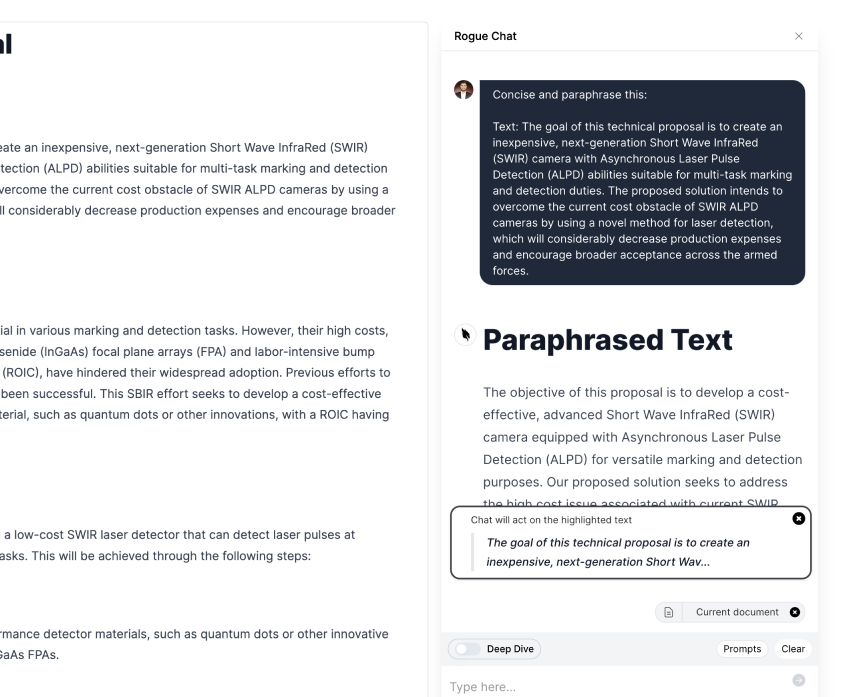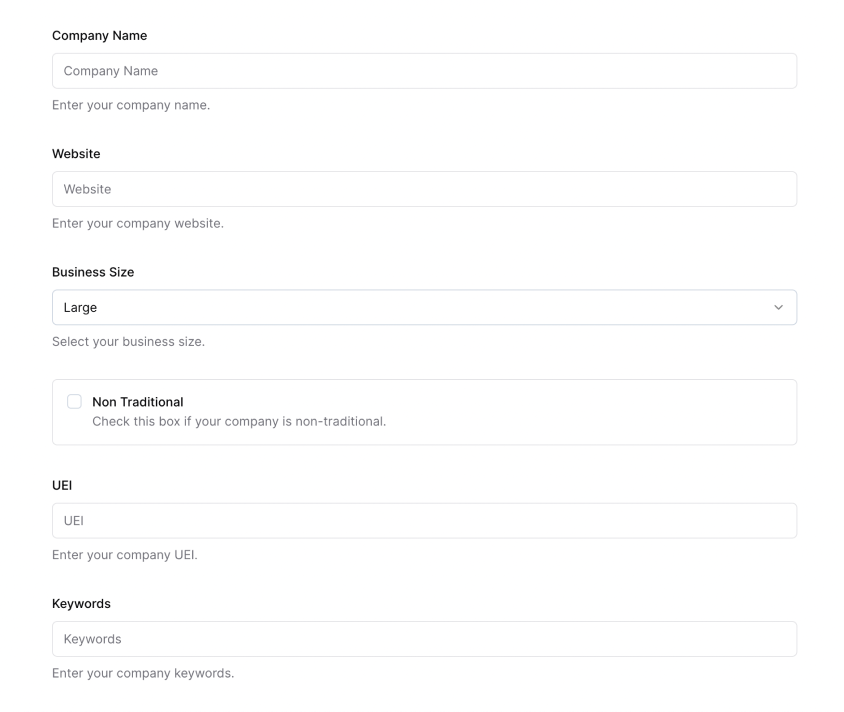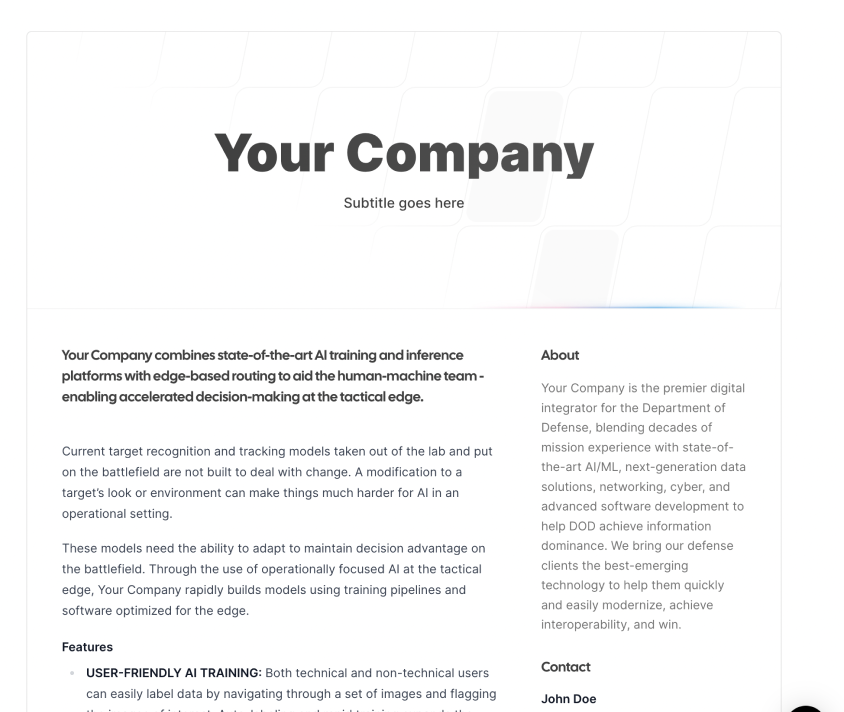
Exploring the Pros and Cons of Regulating AI in Government Contracting Companies
As a business leader interested in exploring the potential implications of governmental regulation on your company's use of Artificial Intelligence, it is crucial to understand the pros and cons of regulating AI in government contracting companies.
Table of contents
Introduction
Artificial Intelligence (AI) has been making significant strides in various industries, and government contracting companies are no exception. The massive promise of AI lies in its potential to accelerate processes, enhance decision-making, and reduce manual effort across the government contracting industry. Things like RFI responses and proposals, monthly status reports, briefing slides and notes, memoranda that currently consume massive amounts of manual effort will shortly be handled mainly by AI, thus freeing humans up for more important work.
As a business leader interested in exploring the potential implications of governmental regulation on your company's use of Artificial Intelligence, it is crucial to understand the pros and cons of regulating AI in government contracting companies.
The Pros of Regulating AI in Government Contracting Companies
1. Ensuring Ethical Use
One of the primary reasons for regulating AI is to ensure its ethical use, promoting transparency and fairness in decision-making. Government contracting companies often handle sensitive information, and it is essential to prevent discrimination and bias in AI algorithms that could negatively impact certain groups or individuals.
2. Protecting Privacy and Security
Data protection and privacy are significant concerns when using AI in government contracting companies. Regulating AI can help mitigate risks associated with unauthorized access to sensitive information or cyber attacks that could compromise national security. By implementing stringent data protection measures, government agencies can ensure that AI systems are developed and deployed with privacy and security in mind.
3. Encouraging Quality and Standardization
Regulation can play a vital role in establishing industry-wide best practices and ensuring that government contracting companies comply with legal and regulatory requirements. By setting clear guidelines and standards for AI development, government agencies can foster a culture of quality and consistency across the industry.
4. Promoting Accountability and Responsibility
AI systems can sometimes produce unexpected outcomes due to their complex nature. Regulating AI can establish clear lines of responsibility for these systems, encouraging developers to consider potential consequences during the design and development process. This sense of accountability can help prevent misuse or unintended negative consequences of AI systems.
See some of these resources:
- Blueprint for an AI Bill of Rights
- Advancing Trustworthy AI
- Ethical Uses of AI with the Federal Government
The Cons of Regulating AI in Government Contracting Companies
1. Stifling Innovation
One significant concern when it comes to regulating AI is the potential for overregulation, which may hinder technological advancements. As the use of artificial intelligence (AI) continues to increase in government contracting companies, there is a growing debate about whether or not regulatory oversight is necessary. While some argue that regulation is important for ensuring ethical and safe AI implementation, others worry that excessive regulation could stifle innovation.
One potential consequence of overregulation is a slowdown in the development of new AI solutions. When companies are burdened with extensive regulations and compliance requirements, they may have less time and resources available for research and development. This can limit their ability to experiment with new approaches or technologies that could improve efficiency or effectiveness. Furthermore, overly strict regulations can create barriers to entry for smaller companies or startups that lack the resources to comply with complex rules. This limits competition in the market, which can ultimately harm consumers by reducing choice and driving up costs. Of course, it's important to strike a balance between promoting innovation and ensuring responsible AI use. One possible solution is to focus on creating flexible regulatory frameworks that allow for experimentation while still setting clear standards for safety and ethical considerations. By doing so, we can foster continued innovation while also mitigating potential risks associated with AI implementation in government contracting companies.
2. Increased Costs and Burden
Compliance with regulations can be costly and time-consuming for government contracting companies. The implementation of strict regulations surrounding the use of AI in government contracting companies may have unintended consequences for smaller businesses. While larger corporations may have the resources to invest in compliance measures and adapt their operations accordingly, smaller firms could struggle to bear the financial burden of these requirements.
For many small businesses, complying with new regulatory standards can be costly and time-intensive. They may need to invest in new technologies or hire additional staff members to ensure compliance, which can significantly impact their bottom line. In some cases, these added expenses could make it difficult for them to compete with larger companies that have more significant financial resources at their disposal. In addition to direct costs associated with regulatory compliance, increased oversight and monitoring by regulators could also create an additional administrative burden for smaller firms. Compliance reporting requirements or audits could divert precious time and attention away from core business activities, further impeding a company's ability to innovate and grow.
Overall, while regulating AI usage has its benefits in terms of increased transparency and accountability within government contracting companies, policymakers must carefully consider the potential negative impacts on smaller businesses before implementing stringent regulations. Finding a balance between protecting consumers' interests while not unduly burdening small enterprises is crucial if we want our economy as a whole to thrive.
3. Uncertainty and Ambiguity
As AI technologies continue to rapidly develop, there is increasing concern over the potential for regulations to quickly become outdated or irrelevant. This is due in large part to the uncertainty and ambiguity surrounding AI, which can make it difficult for regulatory bodies to keep up with advancements in the field. One of the primary challenges facing regulators is determining how best to define and classify different types of AI systems. Because these technologies can vary widely in terms of their capabilities and applications, it can be challenging to establish clear guidelines that apply across the board.
Another issue that arises from the rapid pace of development in AI is that regulations may not always keep up with changes as they occur. As new breakthroughs are made, existing rules may need to be revised or updated in order to ensure that they remain effective. Despite these challenges, many experts believe that some level of regulation will ultimately be necessary in order to promote responsible use of AI technology. By establishing clear guidelines around issues such as transparency, accountability, and data privacy, governments can work towards ensuring that these powerful tools are used ethically and effectively within government contracting companies. Furthermore, defining and enforcing AI-specific regulations can be challenging due to the complexity and evolving nature of these technologies.
4. International Competition
The global race for AI innovation has become increasingly competitive, with numerous countries vying to establish themselves as leaders in the field. However, regulatory frameworks can significantly impact international collaboration and trade in this area. Overregulation in one country may drive researchers and developers to other nations that offer a more favorable environment for their work. This phenomenon has important implications for government contracting companies seeking to utilize AI technologies in their operations. If regulators impose burdensome restrictions on these companies' use of AI, they may be forced to look overseas for solutions - potentially putting them at a disadvantage compared to competitors who have access to cutting-edge technology developed under more lenient regulatory regimes.
Thus, it is essential that policymakers strike the right balance between encouraging innovation and ensuring appropriate safeguards are put in place. This requires an understanding of the potential risks posed by unregulated use of AI, as well as an appreciation of how best to foster productive collaborations among industry players globally while still protecting citizens' privacy and security interests. Ultimately, establishing effective regulations around AI will require close coordination across borders - particularly given the speed at which new developments are emerging. Only through careful planning and cooperation can we ensure that all stakeholders benefit from advances in this critical sector while minimizing any negative impacts on international competition or trade relations between nations worldwide.
Balancing the Pros and Cons: Developing a Pragmatic Approach
Given the various pros and cons of regulating AI in government contracting companies, it is essential to find the right balance between regulation and innovation. This balance can be achieved through collaboration between government agencies, industry stakeholders, and academia. By working together to develop effective policies that address ethical, privacy, security, and quality concerns while still fostering innovation, a pragmatic approach to AI regulation can be established.
Closing
The ongoing discussion and analysis of AI regulation in government contracting companies are critical as new technologies continue to emerge and shape the industry. As a business leader interested in the potential implications of governmental regulation on your company's use of AI, engaging in this conversation and staying informed about developments in this area is essential.
By considering the pros and cons of regulating AI in government contracting companies, you can make informed decisions about your company's AI usage and navigate the complex regulatory landscape with confidence.
Sign up for Rogue today!
Get started with Rogue and experience the best proposal writing tool in the industry.



